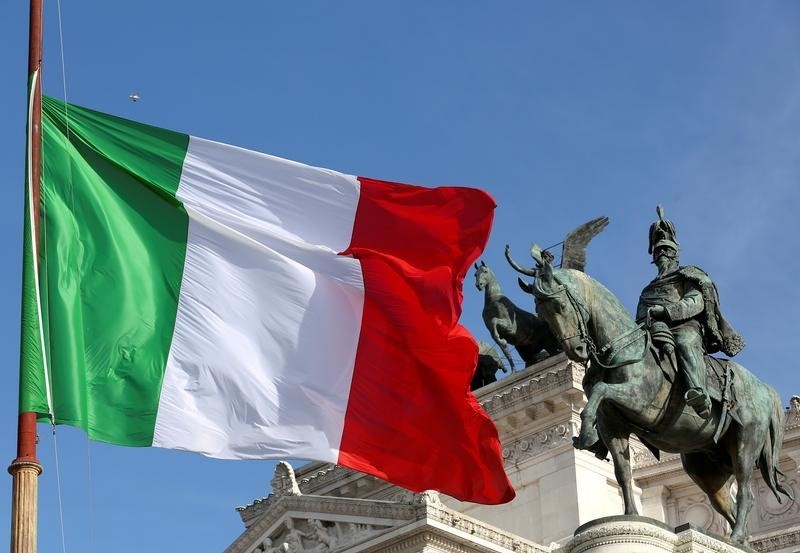By Geoffrey Smith
Investing.com -- Italy's bond and stock markets swooned on Thursday as Mario Draghi resigned as Prime Minister, ending a period of relative political stability and calm in the Eurozone's third largest economy.
By 4:25 AM ET (0825 GMT), the benchmark FTSE MIB stock index was down 2.7%, testing the 19-month low that it hit last week. The yields on Italian government bonds, meanwhile, soared as markets moved to price in a period of substantial political risk ahead.
The yield on the 10-year benchmark bond rose 22 basis points to 3.69%, widening the premium over its German equivalent to 242 basis points. The spread between the two is widely used as a rough proxy for the risk that Italy will be forced out of the currency union by its enormous debt load. The 2-year yield, which typically only reacts to significant political stress, also rose 17 basis points to 1.58%, leaving it nearly a full percentage point above its German counterpart.
Draghi will carry on in a caretaker capacity in the near term.
“After reporting on yesterday’s discussion and vote in the Senate, (Draghi) repeated his resignation and that of his government," President Sergio Mattarella's office said in a statement. "The government remains in office to manage current affairs."
On Wednesday, Draghi had appealed in vain for support for his reform agenda, which includes controversial elements such as cuts to income subsidies and the opening of some local trade monopolies to competition. The Five Stars Movement (M5S), which had already effectively withdrawn its support, refused the call, while the right-wing parties in the government made any reconciliation impossible by saying they would no longer govern alongside M5S.
"Given the poor relations among former coalition partners, there seems to be no room left for another attempt to form a national unity/technocrat government," said ING analyst Paolo Pizzoli in a note sent to clients before Draghi's resignation. "President Mattarella will then have little alternative but to dissolve parliament and call snap elections, which could be held between late September and early October."
"Looking at the political scene in the very short run, the parties which decided to pull the plug will have a hard time explaining to their electorate why such a decision was made at such a difficult economic and geopolitical moment, and this might be particularly difficult with centre-right moderates in richer northern regions," Pizzoli argued.
One of the first consequences of Draghi's resignation will be to complicate the task of the European Central Bank in keeping bond markets orderly as it begins the process of raising interest rates for the first time in a decade. The ECB is due to give an update on the design of a new 'anti-fragmentation tool' whose job will be to deter speculators from betting on a Eurozone breakup. Rising interest rates - which force governments to divert a greater part of their tax revenue to debt servicing - are a particular problem for Italy, whose public debt stood at over 2.25 trillion euros, or over 150% of its gross domestic product, at the end of 2021.
Other countries with heavy debt burdens, such as Greece, Spain, and Portugal - all of which needed bailouts from the Eurozone and International Monetary Fund a decade ago - are also seen as benefiting from the new instrument.
